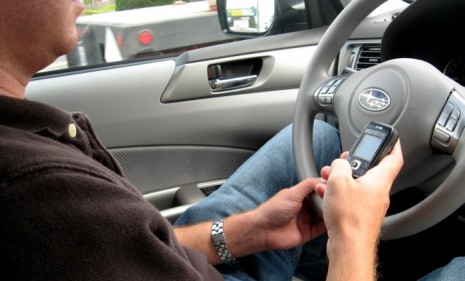5 surprising new facts about driving
Are you among the 30 percent of Americans who has the "bad driving gene"?

A free daily email with the biggest news stories of the day – and the best features from TheWeek.com
You are now subscribed
Your newsletter sign-up was successful
Americans drive 3 trillion miles each year — or, in cosmic terms, about half a light-year. And though the country has had a car culture for decades, technology, population, growth, and crumbling infrastructure have created many complexities and risks for drivers, but also research opportunities for scientists. Here's a look at some of the recent findings in the field:
1. Texting while driving is the new drunk driving
From 2002 to 2007, texting while driving (TWD) caused 16,141 deaths in the U.S. according to a new study from the University of North Texas, accounting for a recent spike in "distracted driving" deaths. In fact, a 2009 study from Car and Driver found that driver reactions were significantly slower when the driver was reading and writing texts than when the driver was legally inebriated. "We're back where we were when we started going after drunk drivers," says Secretary of Transportation Ray LaHood. Still, "no texting while driving" laws in 30 states probably haven't done much to reduce fatalities. If you want anti-TWD laws to work, says Michael Fumento in the Dallas Morning News, start enforcing them — and make the "joke" penalties equal to DUIs.
The Week
Escape your echo chamber. Get the facts behind the news, plus analysis from multiple perspectives.

Sign up for The Week's Free Newsletters
From our morning news briefing to a weekly Good News Newsletter, get the best of The Week delivered directly to your inbox.
From our morning news briefing to a weekly Good News Newsletter, get the best of The Week delivered directly to your inbox.
2. Marijuana: Less dangerous for drivers than previously thought?
A study from Hartford Hospital in Connecticut and the University of Iowa found that smoking marijuana has almost no effect on driving ability. In before-and-after-smoking driving simulations, the only difference researchers found was that, under the effects of cannabis, the subjects drove slower. With alcohol, they noted, people drive faster. I certainly didn't feel "as impaired as I would have been after a few beers or glasses of wine or if I was one of the morons who drive while texting and yakking on cellphones," says Steve Lopez in the Los Angeles Times, after participating in a California Highway Patrol–administered marijuana-driving test. "[But] if I were a cop, I'd [still] have pulled me over."
3. Bad driving is hereditary
People with a specific genetic variant — about 30 percent of Americans — are less-skilled drivers, according to University of California-Irvine researchers. Steven Cramer and his team tested people with and without the variant, which restricts production of the memory-boosting brain protein, and those with it performed 20 percent worse in two separate driving tests. "These people make more errors from the get-go, and they forget more of what they learned after time away," Cramer says.
A free daily email with the biggest news stories of the day – and the best features from TheWeek.com
4. Playing "Grand Theft Auto" can make you a worse driver
Recklessly driving in video games can translate to unsafe driving on the real world, according to researchers. A recent Dartmouth College study found that adolescent drivers who regularly play "Grand Theft Auto" were nearly twice as likely to have been pulled over by the police and twice as likely to tailgate. Studies abroad have also linked car racing video games to risky behavior. "Risk-acceptance is one of the most prominent and important factors in the discussion of the origin of accidents caused by young drivers," says Joerg Kubitzki, a German researcher who has studied the problem.
5. We could take some driving tips from ants
They may not have cars, but army ants are some of the most efficient commuters in the world. Animal behaviorists have found that ants "commute" along trails that function like three-lane highways with well-defined rules of the road. "They're all cooperating," says Tom Vanderbilt, author of the book Traffic. By contrast, as humans, we "want to assert our individuality or our sense of superiority on the road" — which just means that we get stuck in lots of traffic jams.
Sources: Los Angeles Times (2), The Week (2), The New York Times, USA Today, Infrastructurist, Dallas News, eNews Park Forest, Science Daily, LiveScience, GameSpot
-
 Key Bangladesh election returns old guard to power
Key Bangladesh election returns old guard to powerSpeed Read The Bangladesh Nationalist Party claimed a decisive victory
-
 Judge blocks Hegseth from punishing Kelly over video
Judge blocks Hegseth from punishing Kelly over videoSpeed Read Defense Secretary Pete Hegseth pushed for the senator to be demoted over a video in which he reminds military officials they should refuse illegal orders
-
 Trump’s EPA kills legal basis for federal climate policy
Trump’s EPA kills legal basis for federal climate policySpeed Read The government’s authority to regulate several planet-warming pollutants has been repealed